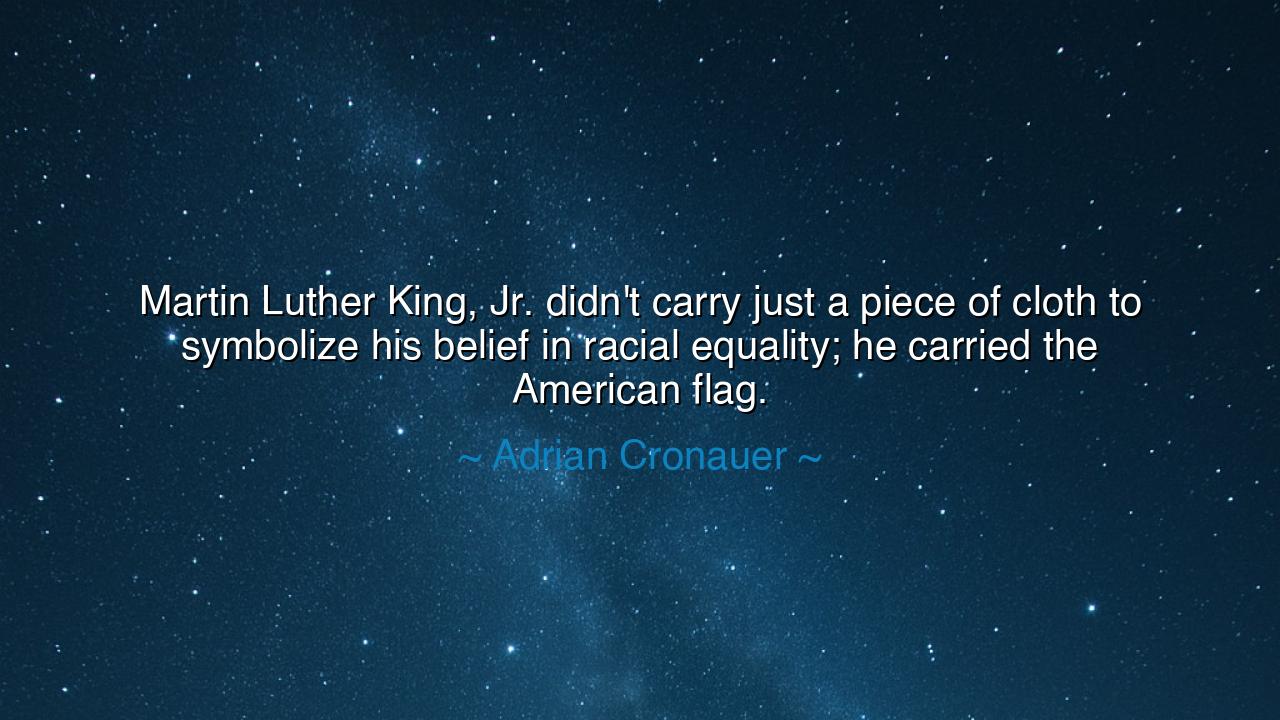
Martin Luther King, Jr. didn't carry just a piece of cloth to
Martin Luther King, Jr. didn't carry just a piece of cloth to symbolize his belief in racial equality; he carried the American flag.






The words of Adrian Cronauer—“Martin Luther King, Jr. didn't carry just a piece of cloth to symbolize his belief in racial equality; he carried the American flag”—resound like a bell struck in the heart of a nation. They remind us that true patriotism is not blind allegiance, but the courage to demand that a nation live up to its highest ideals. When Dr. King marched, he did not reject his country—he summoned it to remember itself. His dream was not foreign to the soil beneath his feet; it was born of the same promise written into the nation’s founding creed: that all men are created equal, and endowed with certain unalienable rights. He did not wave rebellion’s banner, but the flag of unity, believing that justice was not an import from abroad, but a birthright long denied.
To carry the American flag, as Dr. King did in spirit, was to claim ownership of a vision that others had tried to reserve for a few. He knew that the flag did not belong only to those who sat in comfort, nor to those who held power, nor to those whose skin reflected the majority. It belonged to the dreamers, the builders, the marchers, the oppressed, and the hopeful alike. The flag, in his hands, became not a symbol of domination, but of redemption—a call to fulfill what the nation had promised but never yet achieved. It was as if he lifted not just cloth, but the very soul of America, urging it to rise from the dust of its contradictions.
There was a day, the day of the Selma to Montgomery march, when weary feet bled upon the southern roads. Before them lay hatred, behind them the grave. Yet, through fear and doubt, they carried on, singing of freedom. They did not burn flags; they carried them. For they knew the truest protest is not to reject one’s homeland, but to hold it accountable. When state troopers struck them down, it was not rebellion they met—it was rebirth. For the blood spilled on that bridge was the price of a nation awakening to itself. And in that struggle, the American flag—torn, trampled, yet still rising—became a sacred emblem of unfinished justice.
In the ancient ways, heroes bore standards into battle—banners that united tribes, kingdoms, or causes. To lose the standard was to lose hope; to carry it was to bear the weight of a people’s destiny. So too did Dr. King bear his standard: not of conquest, but of conscience. His march was not an invasion, but an invitation—to rise together into the promised land of equality. He wielded no sword, only truth; no armor, only faith. Yet his power shook empires of hate and made the proud tremble, because he fought not against the nation, but for its soul.
The deeper wisdom of Cronauer’s words lies in this revelation: patriotism and justice are not rivals, but reflections of the same truth. The one who loves his country must also challenge it, as a parent disciplines a child for its own good. To turn away from injustice is to betray the flag; to confront it is to honor it. Dr. King’s greatness was not merely in his dream, but in his faith that America could awaken to it. He showed that to love a country is to believe it can become better—and to labor endlessly for that betterment.
Let us, then, remember this teaching in our own time: to carry the flag is not to boast of perfection, but to pledge perseverance. It is to stand firm when truth is unpopular, to speak when silence is easier, and to act when comfort whispers “wait.” Each generation must decide anew what that flag will mean. Will it flutter over division, or will it rise as a sign of unity, stitched together by every color, creed, and hope? The answer lies not in the stars upon it, but in the hearts beneath it.
So, my child, if ever you doubt the worth of your homeland, remember this: it is not the nation’s failures that define it, but the people who refuse to surrender to them. When you march for justice, when you speak for the voiceless, when you lift the weary and confront the proud, you, too, are carrying the flag. Not a piece of cloth, but a living promise—a promise that freedom, once proclaimed, must be made real for all. And as long as that flag flies in your heart, no power on earth can tear it down.






AAdministratorAdministrator
Welcome, honored guests. Please leave a comment, we will respond soon